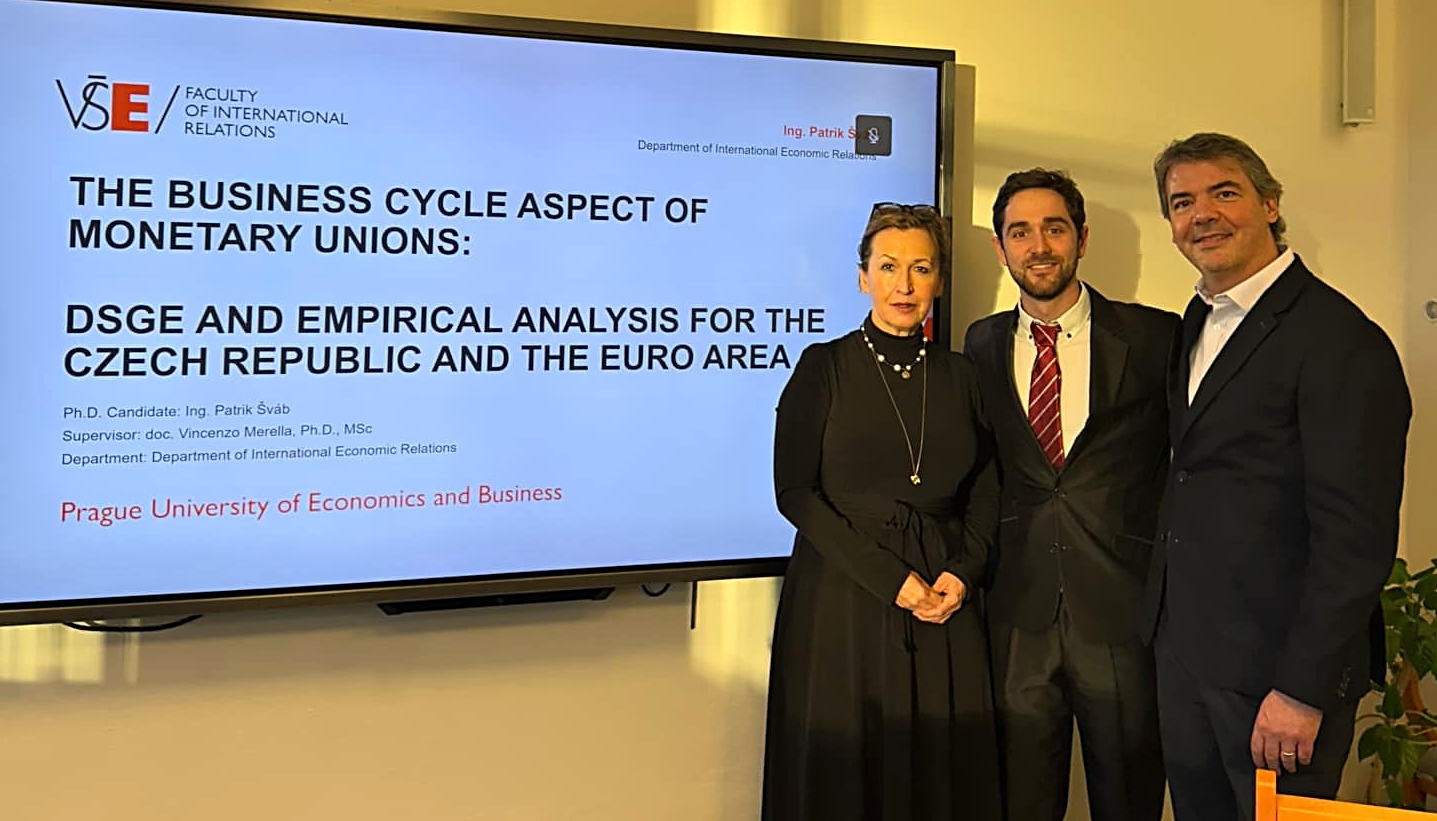FIR Welcomed Its 400th Doctoral Graduate!
We are pleased to announce that the Faculty of International Relations has celebrated a significant milestone – the completion of doctoral studies by its 400th graduate. This achievement underscores the rich history of the faculty’s scientific activities, founded on solid foundations as early as the 1950s. On this occasion, we revisit the story of our faculty’s first doctoral graduate and present the work and experiences of the latest doctoral studies graduate.
The Faculty’s First Doctoral Graduate: Dr. Vladimír Rulf
The first PhD candidate at the Faculty of Commerce of the University of Economics was Vladimír Rulf, who began his scientific aspirantship on November 10, 1954, and successfully defended his dissertation on June 18, 1958. Dr. Rulf was a graduate of the University of Political and Economic Sciences, the predecessor of today’s Prague University of Economics and Business, where he specialized in the economics of domestic trade.
Under the supervision of Associate Professor Dr. Ing. Jaroslav Nikl, he developed a dissertation on the topic “Problems of Economical Organization of Goods Movement,” which dealt with issues of trade organization and planning economics. The dissertation was reviewed by Professor Dr. Vladimír Sedlák, Ivan Loukotka, and Professor Dr. Ing. Leopold Šauer from the Czech Technical University. His successful defence took place under the leadership of the then-dean of the faculty, Associate Professor Dr. Karel Martin Pernica.
The 400th Doctoral Graduate: Ing. Patrik Šváb, Ph.D.
The 400th graduate of the doctoral studies at our faculty is Ing. Patrik Šváb, Ph.D., who dedicated his dissertation to the topic “The Business Cycle Aspect of Monetary Unions: DSGE and Empirical Analysis for the Czech Republic and the Euro Area.” Under the guidance of Associate Professor Vincenzo Merella, Ph.D., MSc, he examined the impacts of adopting the euro in the Czech Republic through a dynamic stochastic general equilibrium (DSGE) model and empirical analysis of economic cycles.
“The main theme of my dissertation is the issue of monetary unions from the perspective of business cycles. Specifically, I focus on the adoption of the euro in the Czech Republic,” describes Dr. Šváb. He was inspired by similar studies focused on Poland and the United Kingdom, which led him to create a New Keynesian DSGE model adapted for the Czech Republic and the Euro Area. This model, a simplified version of those used by central banks, evaluates the benefits and risks of adopting the euro.
“The further I progressed with the research question, the more I realized how big a bite I had taken by choosing DSGE models,” admits Dr. Šváb. The complexity of the methodology was one of the biggest challenges, along with the obligation to publish articles in academic journals and balance studies with work and personal life. Nevertheless, he emphasizes that our faculty has made significant strides in supporting its doctoral students.
He further emphasizes that despite the modeled losses, it is necessary to consider other economic and political criteria before deciding on adopting a common currency. To minimize risks, he recommends improving the efficiency of fiscal policy, greater economic diversification, and better public awareness. “The greatest contribution of my work is the creation of a DSGE model for the Czech Republic and the Euro Area, which, among other things, evaluates the benefits and risks of adopting a common currency. However, based on my results, I would not dare to make a definitive recommendation on whether the Czech Republic should or should not adopt the euro. Such a conclusion would still be a long way off.”
The stories of the first and 400th doctoral graduates represent not only the continuity of scientific research at the faculty but also its ability to adapt to new challenges and develop research in a dynamically changing world. “I am even more pleased when I see the quality of research by beginning doctoral colleagues, who at the start of their studies match my level at the end of my studies. I look forward to their results, which will continue to improve. I believe that the level of research at the faculty will continue to rise,” adds Dr. Šváb.
We wish all current and future doctoral students much success on their scientific journey!
